President Eyring Champions Marriage at Interfaith Gathering
Contributed By Jason Swensen, Church News staff writer
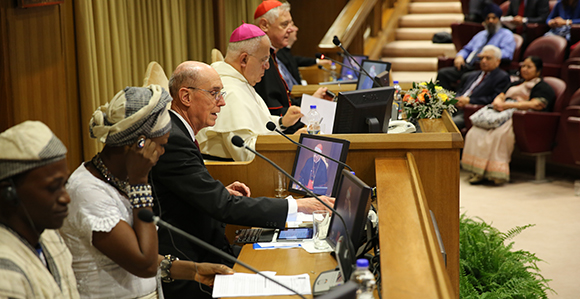
President Henry B. Eyring of the First Presidency (middle) and other faith leaders at the Colloquium on the Complementarity of Man and Woman at the Vatican, November 18, 2014.
Article Highlights
- Unselfishness is the key to complementary marriage between a man and a woman.
- Following “The Family: A Proclamation to the World” will create “a renaissance of happy marriages and productive families.”
“As we work to build and encourage faithful, loving marriages in which men and women become as one and nurture their families, the Lord will multiply our efforts.” —President Henry B. Eyring of the First Presidency
VATICAN CITY
On November 18, President Henry B. Eyring, First Counselor in the First Presidency, stood before a prominent gathering of global religious leaders and testified of the essential and eternal nature and role of marriage.
“I am grateful to be invited to be a witness at this colloquium,” he began. “I am especially grateful for the opportunity to give evidence that a man and a woman, united in marriage, have a transcendent power to create happiness for themselves, for their family, and for the people around them.”
(Read the full transcript of President Eyring’s address.)
President Eyring was acting as an invited “witness” at the international interreligious event entitled “The Complementarity of Man and Woman.” The historic three-day gathering (November 17–19) is hosted by the Catholic Church and includes religious leaders from 14 faiths and almost two dozen nations.
In his remarks, the Latter-day Saint leader declared himself as “an eyewitness” of the power of a marriage between a man and a woman “to produce happiness for each other and for their family.”
He spoke of once being a single man, living alone and working on his doctorate at Harvard University. He thought at the time that he was happy and content. His academic research was going well, he was serving others through the Church—and he found plenty of time to work on his tennis game.
Then one day a Church assignment took young Henry to an outdoor meeting in New Hampshire.
“As the meeting ended, I saw in the crowd a young woman,” he said. “I had never seen her before, but the feeling came over me that she was the best person I had ever seen.”
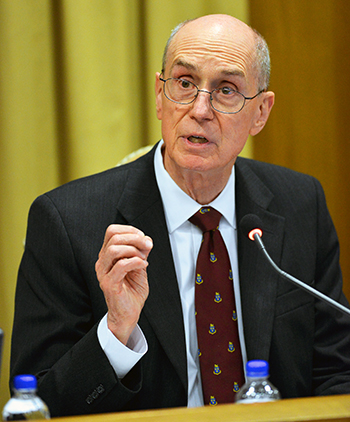
President Henry B. Eyring of the First Presidency speaks at the Colloquium on the Complementarity of Man and Woman at the Vatican, November 18, 2014.
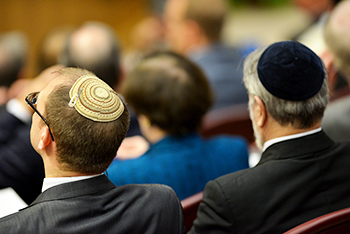
The audience listens in the Synod Hall at the Colloquium on the Complementarity of Man and Woman at the Vatican, November 17-19, 2014.

File photo of President Henry B. Eyring and his wife, Kathleen, at the October 2009 general conference. President Eyring spoke of his marriage during his “eyewitness” account of the power of marriage at the Vatican on November 18.
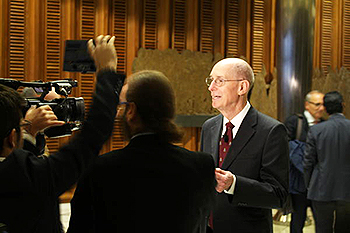
President Henry B. Eyring, First Counselor in the First Presidency of the Church, addresses members of the media at the Vatican in Synod Hall. Photo by Rob Morton.
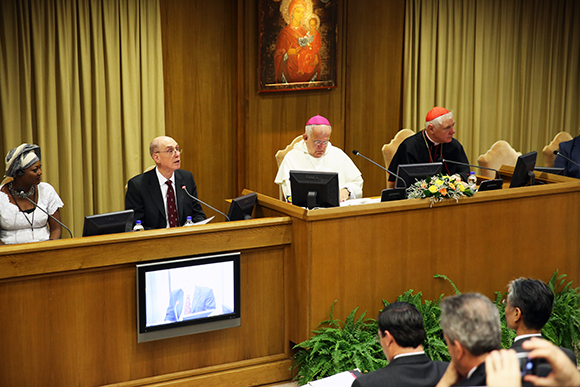
President Henry B. Eyring speaks at the Colloquium on the Complementarity of Man and Woman at the Vatican, November 18, 2014.

Pope Francis greet President Henry B. Eyring in Synod Hall at Vatican City as the colloquium on marriage begins. © Photograph by Chris Warde-Jones/Hamanum.it.
An inspired thought came to his mind: “If I could only be with her, I could become every good thing I ever wanted to be.”
A year later, Henry B. Eyring married Kathleen Johnson—that young woman in the crowd—in a Mormon temple. “The words spoken in the ceremony included a promise that we might be husband and wife in this life and for eternity. The promise included that whatever descendants we might have would be bound to us forever if we lived worthy of that happiness.”
President and Sister Eyring believed those promises and wanted such happiness. In 52 years of marriage, they have known sickness and health, the births of six children, and, later, grandchildren and a great-grandchild.
Their marriage, he added, marks a fulfillment of hope.
“I have become a better person as I have loved and lived with her,” he said. “We have been complementary beyond anything I could have imagined. Her capacity to nurture others grew in me as we became one. My capacity to plan, direct, and lead in our family grew in her as we became united in marriage.
“I realize now that we grow together into one—slowly lifting and shaping each other, year by year.”
President Eyring said the differences between him and his wife have combined to form a better whole. “Above all, our unique abilities allowed us to become partners with God in creating human life. The happiness that came from our becoming one built faith in our children and grandchildren that marriage could be a continuing source of satisfaction for them and their families.”
The Church leader acknowledged that not all marriages produce happiness. One prime factor, he said, can make the difference between being happy or unhappy.
“Where there is selfishness, natural differences of men and women often divide,” he said. “Where there is unselfishness, differences become complementary and provide opportunities to help and build each other.”
It’s essential for marriage partners to replace self-interest with charity and benevolence, he noted. “Only then will people be able to make the hourly unselfish sacrifices necessary for a happy marriage and family life—and to do it with a smile.”
President Eyring said key guidelines on marriage are found in the Church’s 1995 document “The Family: A Proclamation to the World.” He read from the proclamation:
“Husband and wife have a solemn responsibility to love and care for each other and for their children. ‘Children are an heritage of the Lord’ (Psalm 127:3). Parents have a sacred duty to rear their children in love and righteousness, to provide for their physical and spiritual needs, and to teach them to love and serve one another, observe the commandments of God, and be law-abiding citizens wherever they live. Husbands and wives—mothers and fathers—will be held accountable before God for the discharge of these obligations.
“The family is ordained of God. Marriage between man and woman is essential to His eternal plan. Children are entitled to birth within the bonds of matrimony, and to be reared by a father and a mother who honor marital vows with complete fidelity. Happiness in family life is most likely to be achieved when founded upon the teachings of the Lord Jesus Christ. Successful marriages and families are established and maintained on principles of faith, prayer, repentance, forgiveness, respect, love, compassion, work, and wholesome recreational activities. By divine design, fathers are to preside over their families in love and righteousness and are responsible to provide the necessities of life and protection for their families. Mothers are primarily responsible for the nurture of their children. In these sacred responsibilities, fathers and mothers are obligated to help one another as equal partners. Disability, death, or other circumstances may necessitate individual adaptation. Extended families should lend support when needed.”
Such sacred tenets, he declared, are essential to produce “a renaissance” of happy marriages and productive families. “Such a renaissance will require people to try for the ideal—and to keep trying even when the happy result is slow to come and when loud voices mock the effort.”
In conclusion, President Eyring called for a unified defense of marriage between a man and a woman.
“As we work to build and encourage faithful, loving marriages in which men and women become as one and nurture their families, the Lord will multiply our efforts,” he said. “As we join together in this work, I promise progress toward that happy result.”
